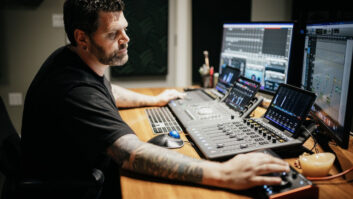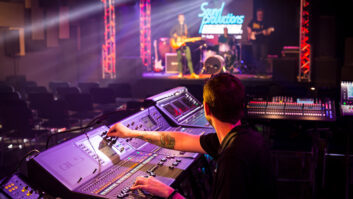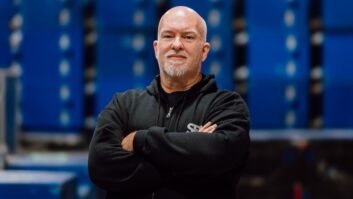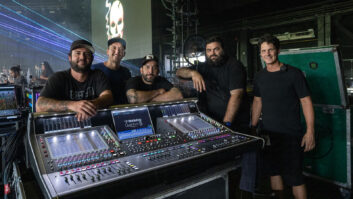Whether they’re creating simple pop songs or grand, sweeping orchestral scores, musicians across the globe are looking to express emotion and evoke emotion in their listeners. Composing music for a film, though, is a bit different than straight songwriting. Rather than pour out their own emotions, film composers are called on to heighten the emotions being evoked by the images. It’s a challenge for many musicians, and that’s why the film music production team of Teese Gohl and Steve McLaughlin, collectively known as Gohl/McLaughlin Productions, gets the call from a handful of A-list film directors and producers.
To date, Gohl/McLaughlin has worked on such films as The Red Violin, which earned them an Oscar for Best Score, Titus, The Iron Giant, Cookie’s Fortune and Flawless. Most recently, McLaughlin produced Michael Kamen’s score for X-Men, Guy Pratt’s score for County Kilburn and was working on The Count of Monte Cristo with Ed Shearmur. Gohl produced Michael Small’s score for South Pacific, and Elliot Goldenthal’s tracks for Final Fantasy and the upcoming Julie Taymor film Frida Kahlo. Gohl is a keyboard player/producer, and McLaughlin is a Grammy Award-winning engineer. What makes their pairing a bit odd is the fact that Gohl works in New York and New Hampshire and McLaughlin in London. “We’d like to be in the same place,” says Gohl. “We always hook up at some point, but it’s not always possible to spend a month or two months locked away in some studio, and it’s also not necessary anymore. We both have studios in our homes that can facilitate everything from rough demos to final mixes.”
Though they have worked with well-known composers like Michael Kamen and Elliot Goldenthal, Gohl and McLaughlin have recently started to work with such musicians as Dave Stewart of Eurythmics, Rich Robinson from the Black Crowes and songwriter Bruce Roberts. The goal, so far, has been to combine the twin desires of pop artists getting songs onto film soundtracks and directors getting functional music for their film.
“Pick any rock icon or pop artist who basically has no experience doing film scores but would love to do it and has talent for it,” Gohl explains. “We provide the vehicle to make sure that the music gets done on time and on budget. The film producers are usually very afraid of hiring someone who is used to being in the studio for a month to a year doing an album. Most commonly, you’ll have a few weeks to a couple months to complete a score, and the money is much tighter than in record projects. What we do, through our experience, is provide facilities where that can happen.”
Gohl points to the recent Trip soundtrack, which he produced with Rich Robinson of the Black Crowes, as an example of his studio’s flexibility. “We did a lot of great stuff in my loft in New York,” he says. “In fact, we had trouble when we moved to a studio, because we tried to get some of the vibe.”
Of Gohl’s two studios, the New Hampshire joint is the most ambitious. Not only does it boast the typical Pro Tools and Digital Performer setup, it’s stocked with some impressive studio gear, including an old analog Topaz console. “I could record a small chamber orchestra or a rock ’n’ roll band up there,” he says. “Instead of a small control room and a larger live room, I made it a big open room, put all the hard drives and the noisy gear behind glass, sealed-off doors, and have one sizable iso booth. A lot of the work I do by myself, and I don’t want to be cooped up looking out into this beautiful space.” His New York facility is simply a Macintosh G4, a Roland VM-7200 mixer and a couple of Tascam DA-88s.
Though McLaughlin’s London studio includes some random bits of vintage gear such as Korg Chaos pads, Electro-Harmonix pedals and Decca Tree mic setups, he also relies on the relatively simple Macintosh/Pro Tools/Performer system.
Throughout their production careers, Gohl reports, technology has provided opportunities to experiment as well as save precious time. He points to the score he recorded with Robinson as an example: “Where something was loud and raucous, like a full-distortion guitar, it becomes a much smaller sound sweetened by a string arrangement that I might have done. That can be done fairly quickly outside of the recording schedule while the film is being dubbed.”
If he gets a call during the mix that a cue doesn’t quite work, then Gohl will spend an hour working something up, often from the tracks they’ve recorded and not used, and then send it over via bike messenger. “Or, chances are, we’ll have a music editor on the dubbing stage, and I’ll just work with him in Pro Tools until we get something that works. You use your resources. You might have recorded anywhere from a half-hour to an hour-and-a-half worth of music; there’s a lot of stuff there. If a cue doesn’t work, that doesn’t mean you have to go back and rewrite it overnight and get another orchestra.
When Gohl gets a chance to write scores of his own, he often begins on an acoustic piano. Once he’s ready to get the music down to demo form, he turns to a number of samples housed within a Kurzweil 2500, or he sits at a Roland JV-1080 or the vintage Korg M1, Moog and Prophet DX. As far as modules, he goes back to the Proteus Orchestra for woodwind sounds and analog modules by Oberheim. There are even the rare times when he’ll use a Yamaha VL-1 to perform some physical modeling. “It is a difficult instrument to master, but it is a fantastic instrument for monophonic sounds,” he says of the VL-1. “It was too complicated and too expensive to catch on with the mass market.”
Much like a pop music producer, Gohl is charged with helping the composer down the path while spotting a film. “Depending on how much a composer knows what to do, he’ll just come up with something, or we further coax him along, maybe playing some ideas until we have some themes that we can apply to various scenes. Then we build it up from there,” he says. “During something like The Red Violin, you’re talking about a very experienced, polished composer in his own right. So, during that project, I did not write a single note. My job was to produce everything from the recording sessions to the technical aspects of music editing, how it’s cut in and how it appears in the final dub of the film.”
The team’s main responsibility, it seems, is to make sure that all involved are happy with the final score, including directors, producers and composers. Gohl points to the recent work his partner performed on The X-Men soundtrack, written by Michael Kamen. “The director wanted that type of John Williams soaring orchestral score, the producers wanted more of a drum-oriented, Hans Zimmer rock ’n’ roll thing,” he recalls. “What happened in the end was a combination of the two, all of which landed on Steve’s shoulders, because the composer had no interest in doing something that’s not him. So, he started to generate some of those loops, some of those rhythms, and integrating with the music that Michael had written. In the end, you have a working compromise. It’s always a compromise; it’s not always satisfying, but you have something that everybody’s happy with.”
Obviously, that’s not always possible, and that fine line of making everyone happy is a challenge. Gohl takes the long view to survive the internal battles. “You walk [the line] by knowing that this is just another movie,” he says. “Even if it’s the biggest hit of all time, you know what the best music was for the film and why it’s there.” And having a sense of humor helps, he adds. “When Steve and I work together, we have a lot of fun. You’ve got to have fun. The sense of humor and the lightness, especially in the tough parts, is really important.”
David John Farinella is a freelance writer based in the San Francisco Bay Area.






